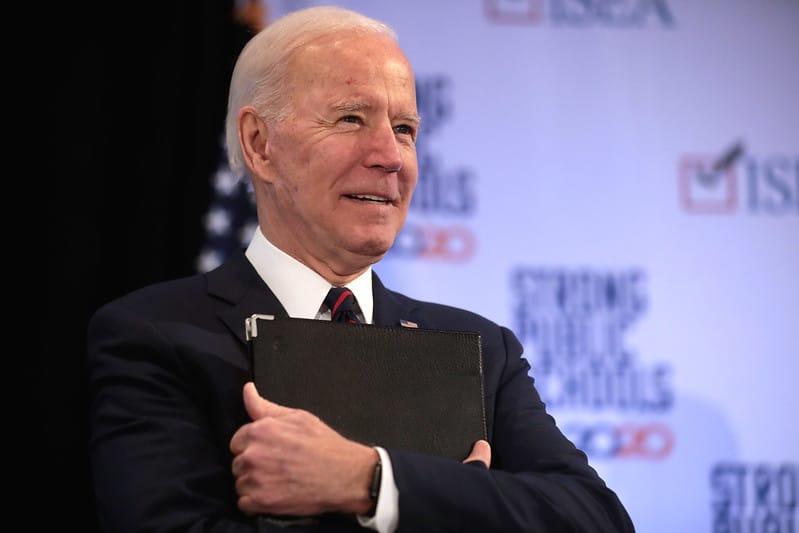On April 26, President Joe Biden announced that he was using his clemency powers to pardon three people and commute the federal prison sentences of 75 others. Virtually all of them were incarcerated for nonviolent drug convictions.
Biden’s announcement signals once again that presidential clemency is not a path to macro-level change.
Clemency will be life-changing for the 75 recipients. Like Robert Barrio, a California man sentenced to serving life without parole for cocaine distribution in Oklahoma, who will now be released this August. And Quang Nguyen, who got a 10-year prison sentence for a marijuana home-grow operation in Texas, but can now do the rest of his sentence on home confinement.
Yet Biden’s announcement signals once again that presidential clemency is not a path to macro-level change. There are 67,000 federal drug war prisoners. As of January 20, 2022, more than 18,400 clemency petitions were awaiting action from the president. And Biden will release a mere 75 of them early—often only slightly early—in a move that Washington Post reporters described as “sweeping.”
Of the three people who received pardons, one wonders how they came to be convicted in the first place. Betty Jo Bogans, for instance, tried to act as a drug “mule” for her boyfriend and his friend, “neither of whom were detained or arrested,” according to the White House press release. She, meanwhile, served seven years in prison.
Moreover, Biden’s move appears to be the result of lobbying from a celebrity-connected network of clemency activists, such as Weldon Angelos, a former cannabis prisoner who counts Snoop Dogg among his friends. It carries over a troubling Trump trend for this unique and in practice, arbitrary, presidential power: People with celebrity backing are more likely to receive mercy, while others who are similarly situated don’t.
The use of clemency power by the leaders of other Western nations has sometimes been of an entirely different order.
Presidents are usually stingy with mercy. In the 21st century, President George W. Bush granted clemency to 11 people, while President Donald Trump granted it to 94 people. President Barack Obama initiated a much more ambitious clemency program, granting it to 1,715 people, but limited almost entirely to people with nonviolent drug convictions. The way Obama selected clemency recipients has also been criticized, leading the Center on the Administration of Criminal Law at NYU Law School to refer to his system as a “mercy lottery.”
The use of clemency power by the leaders of other Western nations has sometimes been of an entirely different order. In August 2006, for example, the Italian government announced blanket clemency to more than 40,000 prisoners—amounting to a third of the nation’s prison population. That was the result of calls for decarceration from Pope John Paul II; crime rates were not adversely impacted.
The US has even more need for large-scale action. Despite some decarceration efforts in recent years, the incarcerated population still stands at almost 2 million—still the highest in the world. Over 200,000 people are in federal prisons or jails.
But the political reality is that presidents want to get re-elected in a deeply divided country. Clemency records are easy pickings for partisan attacks. Public outrage is easy to generate when mercy is granted for stigmatized behaviors, whether harmful to others or not—especially if there’s any hint that a president may be guided by cronyism or partisanship in the use of clemency powers.
When George W. Bush granted clemency to Lewis “Scooter” Libby, the former chief of staff to his vice president, Dick Cheney, it triggered highly critical hearings before the US House. When President Bill Clinton commuted the sentences of over a dozen members of FALN, a group campaigning for Puerto Rican independence, which planted bombs in the US, he was accused by Republicans in Congress of emboldening would-be terrorists. Both the House and Senate passed resolutions condemning Clinton.
Each presidential election since 1984 has been decided by a margin under 10 points in popular-vote terms. And continuing political polarization makes major swings unlikely. As Dean Obeidallah recently pointed out on CNN, the Republican Party is still moving further to the right, while Democrats have moved further left overall, by some measures.
Presidents are acutely conscious of their thin margins and have little to gain, electorally, through clemency.
So any return to the days when a presidential candidate could carry 60 percent or more of the popular vote—as with Richard Nixon, a Republican, in 1972, or Lyndon B. Johnson, a Democrat, in 1964—is extremely unlikely. Nixon shortened sentences for 60 people and pardoned 863 people, which was many more than both Presidents Bush. While Obama was an outlier in general, Johnson was similarly more merciful than Clinton.
Human stories seem more integral to winning or losing voters than dry policy points, and perhaps no area of governance sparks more emotion than crime. Presidents are acutely conscious of their thin margins and have little to gain, electorally, through clemency. So only a token number of politically “safe” prisoners receive any mercy, and thousands of deserving cases are ignored.
Biden is being celebrated in some criminal justice reform circles for his modest moves. His action is praiseworthy for happening early, which some suspect may be a sign that more is to come. Presidents usually only grant clemency petitions in their second term, or at the very end of the first.
However, at the same time, Biden’s Justice Department continues to seek 10 years-to-life in prison for people like Jonathan Wall, who, at worst, transported marijuana from a state where it is legal to a state where it is not. Of course clemency in any form is welcome. But it should not distract us from the bigger picture.
Photograph by Gage Skidmore via Flickr/Creative Commons 2.0





Show Comments